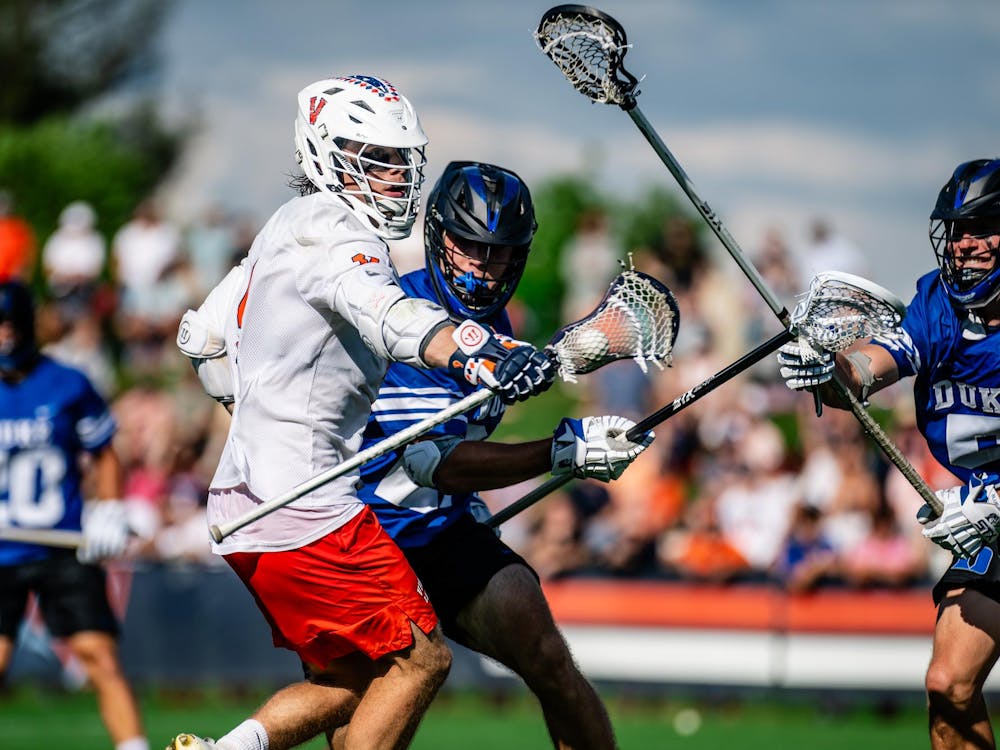Tony Bennett left his heart in San Francisco. Maybe some lucky Virginia football fan making the trek out there for the Emerald Bowl will be able to find it and replace it with the one the Cavaliers broke this season.
The Cavaliers finished second in the ACC in the 2002 football season with a 6-2 record. Since then, Virginia has played .500 ball in conference play, compiling a 12-12 mark the last three seasons, including a dismal fifth place out of six finish in the Coastal Division this season.
Virginia can credit its weak out-of-conference schedule for its bowl eligibility this season. The Cavaliers needed all three wins against Syracuse, Western Michigan and Temple to qualify for postseason play and as a reward, will travel 3,000 miles to play a mediocre Utah squad at noon on Dec. 29. While a formal offer won't come until Monday, all reports have Virginia heading to San Francisco, as Emerald Bowl officials will be left with the ACC school that the seven other bowls don't want.
It was not a fun year to be a Virginia football fan. But as much as I want to get angry, point fingers and call for heads to roll, it's hard to blame Groh or Hagans or anyone else for that matter. The main reason the Cavaliers struggled so much this season was an exorbitant number of injuries.
I know this isn't exactly a groundbreaking discovery on my part. Any Virginia fan even casually following the team this season was aware of the fact that several of the team's stars missed time because of injury. But I think most fans don't realize how much of an impact these injuries really had on the team this year.
Linebacker Ahmad Brooks, Virginia's most heralded returner, missed the first three games while still recovering from offseason knee surgery, and then injured his ankle against Maryland in his first game back. Brooks never seemed to get back to full strength and didn't even make the trip to Miami for Virginia's final regular season game.
The other Cavalier who turned down the chance to be a first round NFL Draft pick for a senior season in Charlottesville, D'Brickashaw Ferguson, went down in Virginia's third game against Duke and did not even take the field in Virginia's losses to Maryland and Boston College.
Running back Wali Lundy, a prominent part of Virginia's offensive attack since winning a starting position as a true freshman in 2002, went down in the first half of Virginia's season opener against Western Michigan. He took a few snaps in the squad's third and fourth games against Duke and Maryland and even played into the second half the two weeks after that against Boston College and Florida State, but never seemed to truly get back to full strength.
Even signal caller Marques Hagans, who didn't miss a single start all year, strained his right hamstring during the Florida State game and was clearly less than 100 percent the following week in Virginia's 7-5 loss at North Carolina.
On top of all of these injuries, cornerback Chris Cook broke his leg against Boston College in the middle of a successful freshman campaign. Safety Nate Lyles injured his head against Georgia Tech and missed Virginia's last two games, which the team lost. Outside linebacker Jermaine Dias missed four games in October because of a fracture in his right foot. Nose tackle Ron Darden was forced to end his football career before the Nov. 3 Temple game because of recurring headaches.
You name the ailment, a Virginia player likely suffered from it in 2005.
Injuries are part of the game, and all teams have to overcome the absence of a starter and rely on second stringers to step-up. But few teams have to deal with as many injuries to as many impact players as the Virginia Cavaliers did this fall. This led to walk-ons like Ryan Best and Byron Galsby earning significant playing time in the secondary and causing Groh to insert more freshmen than expected into the lineup.
Groh has been criticized for playing so many freshmen, particularly prized defensive end Olu Hall (94 plays) and wide receivers Kevin Ogletree (7 receptions) and Maurice Covington (5 receptions). With so many players going down, Groh had to dig deep into his bench to fill the void. Even at wide receiver, where Virginia had its full arsenal of healthy players throughout the season, Groh's decision to throw Ogletree and Covington out there seems justified. With the running game failing the Cavaliers, you can't blame Groh for utilizing all of his available resources at wide receiver. The coach was just making sure he was doing everything he could to give Virginia a chance to win.
Groh accomplished that feat six times out of 11 this season -- good enough to secure a bowl berth for the fourth straight season. And for the fourth straight season, Virginia's bowl will be played before New Year's Day against a less-than-stellar opponent. Considering all the injuries Virginia had to overcome this season, I'll take a spot in the Emerald Bowl and hope that karma swings back in Virginia's direction next season.






